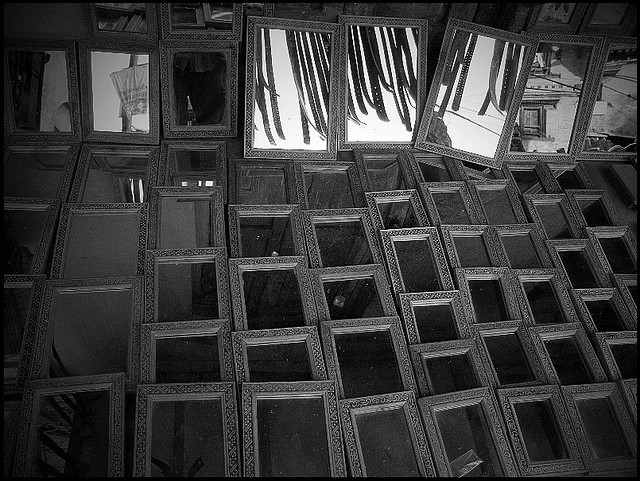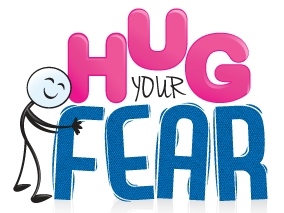
How you handle fear is intimately tied to how you feel about yourself; they feed off of each other.
As I’ve mentioned before, hugging your fear means getting close to it by observing how it affects your body, thoughts, emotions and actions. This closeness takes the sting out of fear, helps you accept it for what it is and learn how to take steps with it instead of running away from it.
Since what you are observing when you observe fear is essentially yourself, if you are filled with self-hate, it is very unlikely that you will be able to hug your fear. It is more likely that you will use your observation time to terrorize and judge yourself for the things that you find.
Now what do I mean when I talk about self-love? I don’t mean that you can look yourself in the eye and say “I love you” without flinching or bursting into tears. That’s too simple and for the people who can learn to love themselves by just looking in the mirror, God bless you!
Self-love to me means the ability to accept and appreciate who and how you are with your thoughts, words, and actions – emphasis on the actions.
It can be hard to tell how you really feel about yourself if you just focus on your thoughts. Thoughts can be deceptive and sometimes unwieldy. Looking at the full extension of your thoughts, the actions you take, can help tell you how you feel about yourself.
- Do you speak harshly about yourself to others?
- Do you take care of your physical needs?
- Do you allow yourself to express the full range of your emotions?
- Check what you say to yourself when you cry or get excited or get angry. Do you say things that welcome those emotions or are they things that shut them down?
- Do you allow yourself to be manipulated by others, doing things that you don’t want to do or feel uncomfortable doing?
All of these are signs that you might not really love yourself, especially not in a way that encourages growth and personal connection.
Our society encourages us to look outside ourselves for validation.
When we were born, the search for unconditional love began. Some of us got it from the big people around us, but for many of us, conditioning replaced unconditional love and we were taught that to be loved we had to be a certain way or do/stop doing certain things.
As we grew older, that desire for unconditional love never went away. It stayed with us, pleading to be satisfied.
This drive causes us to be in relationships that aren’t healthy for far too long, take drugs to fill the hole inside, work so hard we never have time for anything else or try to be perfect in our appearance in person and online to garner approval from friends and strangers alike.
Sadly what most of us never seem to realize is that you are the only person who can give yourself the type of unconditional love that you’re looking for. Other people, as much as they might try, can’t be that for you on a consistent basis. They have their own needs and issues to work out and that’s ok. Some people get close to loving us unconditionally, and that is a wonderful thing, but we are really the only person we know who is with us 24/7 up until we close our eyes for the last time.
We must learn how to love ourselves without condition, to be that person that we can rely on at all times to say, “Everything is ok. I love you just as you are. There is nothing wrong with you. You can face this fear because I’ve got your back.”
To get to this place though is a process. Sometimes a terrifying one, but also one filled with compassion and joy and peace. Once you start actively grasping how much you can love yourself (without even making yourself change), the more you want to keep practicing it.
This is why hugging your fear and hugging yourself is so intimately intertwined. Lots of fear comes up on the journey to loving yourself. As you learn to sit with fear, the same process can be used to learn how to sit with and hold yourself and vice versa.
For most of my life, I hated myself. When around other people, I was usually smiling, but inside I hated myself.
I felt like something was wrong with me (I was too quiet, I wasn’t cool enough, I was too tall, I wasn’t smart enough, I wasn’t loveable, I was too sad, I could go on…). Fortunately I found a therapist who helped me express some things I had been holding onto. That release and taking the time on my own to understand myself by writing and reading and trying new ways of being has helped me get to this point where I can say I love myself, but more important than that I can see that love in the way I speak up for my needs and choose what works for me more often and take the time to do what I like and share myself with others and most special how I comfort and sit with myself when I am in tough times instead of judging or yelling or repressing.
As an example, for a long time I rarely cried and when I did I apologized (if I happened to be around others) or used it as another sign that something was wrong with me (if I was alone). Crying was weak and wrong. No one ever explicitly told me that, but I picked it up along the way that crying was bad and smiling was good (even if you really felt like crying).
Although I’m still learning how to cry more often, when I do cry, I find ways to allow that to happen without apology or beating myself up. I find ways to be with myself, comforting and supporting, loving without condition. Sometimes it could be through writing, or talking aloud to myself or simply holding myself in some way and speaking kind words.
And what a difference it makes! It has brought me more peace and a feeling of safety. I know that I will always have myself in my corner and that feels so good. I also know that the journey to self-love is one without a destination. It is a journey that includes a choice we make to choose love over hate often on a moment by moment basis, over and over again.
I just finished re-reading a book by Cheri Huber called There is Nothing Wrong With You (I totally and fully recommend this book for anyone struggling with self-hate. I’ve read it more than once – a rare occurence for me – and it is a fantastic support on your self-love journey. And yes it’s an affiliate link, I sincerely appreciate your support if you choose to buy it). I’d like to end with a passage from that book that drives home the journey of self love:
[quote align=”center” color=”#0070B4″]
There is no secret that will fix you. (Remember, there is nothing wrong with you.)
This is a lifelong process. If you decide to learn to care for yourself, to live your life in compassion, you will be required to practice that until you die.
An internal relationship must be worked on and maintained just like an external relationship.
And that’s good news! When you fall in love with someone, you don’t say, “Oh, no, how long am I going to have to love this person?” When we’re in love, we love to love that person, and we hope it will last forever.
-Cheri Huber
[/quote]
I’d appreciate your thoughts on this! Can you see yourself hoping to be able to love yourself forever? Can you see how loving yourself and moving through fear are intertwined in your life? Please share your thoughts in the comments and share this post with anyone you think might be helped by reading it!
Until next time,
Varonica 🙂
Image: “Mirrors from Bhaktapur, Nepal” by Sukanto Debnath is licensed under CC BY 2.0
If you liked this post, you might also like:
What Hugging Your Fear Really Means and How it Can Help You Live a Happier Life
5 Easy Ways to Make Fear Less Scary and Take Steps towards Your Dreams
10 Lessons about Fear, Going to a Conference Alone and Living Your Dreams from the 2014 World Domination Summit

That was so good for me to read, today. It’s just what I needed. I love how life brings you what you really need. Just like my fear is really a sign for what I “need” to deal with and once again I’m reminded that the base, the very first and most important step is accepting and loving myself. Everything, including facing my fears, has to start, with loving myself. Thank you for all you share. xo
Thank Erika! I love when life brings us just what we need! That happens for me too, especially with books. Loving ourselves is really the base that supports all that we do.